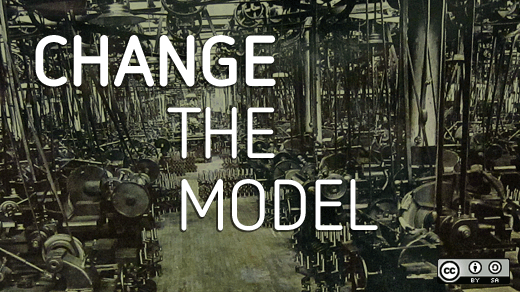The open organization community at Opensource.com welcomed the second half of 2016 with a Twitter chat discussing "open organizations and non-profits." Voices old and new participated, and our chat was (as always) compelling. Read the recap below as you prepare for the next #OpenOrgChat.
Q1: What makes a union between OpenOrg thinking and non-profit work so appealing? #OpenOrgChat
A1: Non-profits and OpenOrg thinking thrive on passion & purpose! #OpenOrgChat
— David Egts (@davidegts) July 21, 2016
A1:Software Freedom issues are essential to everyone on a societal level, and it's orgs that are doing a lot of this work #OpenOrgChat
— karen sandler (@o0karen0o) July 21, 2016
A1 While we should partner with companies, and they can do good work, we can't rely on them to have our best interests at heart #OpenOrgChat
— karen sandler (@o0karen0o) July 21, 2016
A.1. #OpenOrgs bring out the individual passion and collaborative mindset -- both critical to #NonProfit organizations #OpenOrgChat
— E.G.Nadhan (@NadhanEG) July 21, 2016
A1 many #nonprofit orgs are de-centralized w/ national & state chapters - open org makes collab easier #openorgchat https://t.co/U5F3PrbS6e
— JP Sherman (@jpsherman) July 21, 2016
A1. Employees in #Nonprofits and #OpenOrgs do what they do because they want to do it -- not because they have to do it #OpenOrgChat
— E.G.Nadhan (@NadhanEG) July 21, 2016
RT @jhibbets: A1: Open Organizations and NPO's share a very important component: They are both mission-driven organizations #OpenOrgChat
— jackieyeaney (@jackieyeaney) July 21, 2016
A1: #openorg thinking promotes volunteerism, which is the fuel for non-profits. #OpenOrgChat
— Guy Martin (@guyma) July 21, 2016
AI: Charities can provide open orgs with opportunities when their missions align w/ the public interest. #OpenOrgChat
— Tony Sebro (@keynote2k) July 21, 2016
Q2: How does an organization's status as non-profit affect organizational culture? #OpenOrgChat
A2: The mission is the cultural motivator for non-profits & its employees. #OpenOrgChat
— David Egts (@davidegts) July 21, 2016
.@openorgbook A2 it sharpens focus on things like smart use of limited resources, and being lean and effective. #OpenOrgChat
— Thomas Cameron (@thomasdcameron) July 21, 2016
.@openorgbook A2 it makes folks really focus on "bang for the buck," since bucks are often scarce for non-profits. #OpenOrgChat
— Thomas Cameron (@thomasdcameron) July 21, 2016
A2: In my experience, the culture for non-profits lends itself to more passion and buy-in #OpenOrgChat
— Jason Hibbets (@jhibbets) July 21, 2016
A2: Nonprofit can mean many things. @conservancy is a charity, like @fsf or @gnome. Our status aligns us w/public good. #OpenOrgChat
— karen sandler (@o0karen0o) July 21, 2016
Especially in #FOSS charities, staff is deeply committed and volunteers know they have the best chance of long-term engagement #OpenOrgChat
— karen sandler (@o0karen0o) July 21, 2016
.@openorgbook A2 it makes folks really focus on "bang for the buck," since bucks are often scarce for non-profits. #OpenOrgChat
— Thomas Cameron (@thomasdcameron) July 21, 2016
A2 many nonprofits try to maximize impact w/ less resources - with a community's shared direction, many more hands can help #openorgchat
— JP Sherman (@jpsherman) July 21, 2016
@openorgbook People tend to work in NPOs for love of the work rather than for monetary reasons. Same orientation for OpenOrgs. #OpenOrgChat
— Leslie Hawthorn (@lhawthorn) July 21, 2016
True. Non-profit organd OpenOrg works best when community, contributors, investors are engagged most. #OpenOrgchat https://t.co/4dPBsLYOoO
— Moin Shaikh (@moingshaikh) July 21, 2016
A2: NPO status helps center culture on the purpose but can make innovation slow #openorgchat
— jackieyeaney (@jackieyeaney) July 21, 2016
A2. e.g., @conservancy maintains our corporate policies in a public DVCS. https://t.co/SWIu0P41ES #OpenOrgChat
— Tony Sebro (@keynote2k) July 21, 2016
A2: People tend to work in NPOs for love of the work rather than for monetary reasons. Same orientation for Open Orgs. #OpenOrgChat
— Leslie Hawthorn (@lhawthorn) July 21, 2016
A2: ive found it centered on reaching out to find volunteers to help collaborate, culture is very centered on bringing ppl in #openorgchat
— Máirín Duffy (@mairin) July 21, 2016
Q3: What can open organizations learn from successful non-profits? #OpenOrgChat
A3: How to build trust & do inclusive decision making like @carverc of @UABIT https://t.co/rtdolcDmtH #OpenOrgChat
— David Egts (@davidegts) July 21, 2016
.@openorgbook A3 How to harness that passion to make the mission successful. #OpenOrgChat
— Thomas Cameron (@thomasdcameron) July 21, 2016
A3: Three answers: 1) How to scale 2) How to define a great mission 3) Creating a shared-purpose #OpenOrgChat
— Jason Hibbets (@jhibbets) July 21, 2016
A3: I think there's a maturity model: communications>transparency>self-organization>evidence-based decisions>meritocracy. #OpenOrgChat
— Patrick Masson (@massonpj) July 21, 2016
A3: Keeping external stakeholders regularly briefed on org goals is just as vital as maintaining internal transparency. #OpenOrgChat
— Leslie Hawthorn (@lhawthorn) July 21, 2016
A3: How to break down heirarchies & implement meritocracy effectively. #OpenOrgChat
— Guy Martin (@guyma) July 21, 2016
A3. You have to work hard to earn the next round of funding in #Nonprofits :: There is no steady revenue stream #OpenOrgChat
— E.G.Nadhan (@NadhanEG) July 21, 2016
@openorgbook mission-oriented scrappiness & a genuine celebration of the team's wins made on behalf of the customers/users #OpenOrgChat
— David Ryan (@DaveDri) July 21, 2016
Q4: What are your most effective strategies for aligning passion and purpose? #OpenOrgChat
A4 Making sure that we focus on the most important issues, even if corporate funders aren't interested #OpenOrgChat
— karen sandler (@o0karen0o) July 21, 2016
A4: Ask people what they enjoy doing. Are they Happy? #openorgchat
— Jeff Mackanic (@mackanic) July 21, 2016
A4: Get folks together to explicitly discuss org values. Document visibly & make them an integral part of org culture. #OpenOrgChat
— Leslie Hawthorn (@lhawthorn) July 21, 2016
A4: (cont'd) When tackling tough problems or controversial topics, focus conversation through the lens of *shared* org values. #OpenOrgChat
— Leslie Hawthorn (@lhawthorn) July 21, 2016
A4. Checkout the mission and vision for the #Nonprofit before jumping in :: Aligning passion and purpose :: #OpenOrgChat
— E.G.Nadhan (@NadhanEG) July 21, 2016
A4 1) Hiring well. 2) Acculturation. 3) Reinforcement of mission. 4) Public recognition of impact. 5) Garner feedback. #OpenOrgChat
— Thomas Cameron (@thomasdcameron) July 21, 2016
A4 Trying to prioritize the time to talk about the work you're actually doing #openorgchat
— karen sandler (@o0karen0o) July 21, 2016
A4 Actively seek out other orgs who's values & goals have natural overlaps with your goals - cross pollinate & help each other #openorgchat
— JP Sherman (@jpsherman) July 21, 2016
A4: make it fun, give people permission to ‘brag’ a little about how they are helping the mission. #openorgchat
— Guy Martin (@guyma) July 21, 2016
Part of a trending #OpenOrgChat :: Learnt a new word #acculturation :: What a Day !! this must be an #OpenOrg !!! #RedHat
— E.G.Nadhan (@NadhanEG) July 21, 2016
Q5: What challenges do non-profits encounter when they try to open up (bet @lhawthorn has stories!)? #OpenOrgChat
A5: W/o a clear mission, passionate people may have well intended but widely diverging views. #OpenOrgChat
— David Egts (@davidegts) July 21, 2016
A5: comment threads on @reddit , @HackerNews and @slashdot j/k! #openorgchat
— karen sandler (@o0karen0o) July 21, 2016
A5: Individuals feel very insecure that people will see their failings when the org opens up. This is not NPO specific! #OpenOrgChat
— Leslie Hawthorn (@lhawthorn) July 21, 2016
A5 It's a potentially disruptive culture change (see Cathedral and the Bazaar). It can freak people out to break down walls. #OpenOrgChat
— Thomas Cameron (@thomasdcameron) July 21, 2016
A5: Taking in critique can be very difficult when the org first opens up, especially when org members are driven by passion. #OpenOrgChat
— Leslie Hawthorn (@lhawthorn) July 21, 2016
@lhawthorn so maaaaybe my joke about comment threads wasn't *that* much of a joke! #openorgchat
— karen sandler (@o0karen0o) July 21, 2016
A5: Lawyers are often taught to err on the side of nondisclosure by default. But that may not be what's best for the mission #OpenOrgChat
— Tony Sebro (@keynote2k) July 21, 2016
Q6: What books would you recommend to someone interested in OpenOrg thinking and non-profit work? #OpenOrgChat
A6: #TeamOfTeams by @StanMcChrystal. Bringing diverse teams together to work as one. #OpenOrgChat
— David Egts (@davidegts) July 21, 2016
A6: #Grunt by @mary_roach. Military scientists support troop safety & effectiveness via teamwork & comms #OpenOrgChat
— David Egts (@davidegts) July 21, 2016
A6: The Power of a Positive No, in fact anything from Harvard Negotiation Series of publications. Useful for *everyone*! #OpenOrgChat
— Leslie Hawthorn (@lhawthorn) July 21, 2016
humans are poor predictors of their own behavior, knowing that can help - here's a good book on that https://t.co/Rr8smJchty #openorgchat
— JP Sherman (@jpsherman) July 21, 2016
A6: Facilitators teach Open Org principles to attendees throughout event. If you can attend, do so! https://t.co/dtw02nUQkb #openorgchat
— Leslie Hawthorn (@lhawthorn) July 21, 2016
Q7: What unique value do non-profits bring to open source communities specifically? (we're looking at @o0karen0o!) #OpenOrgChat
A7 Nonprofits have a broader perspective in mind & can think long term in a way that companies can't. #OpenOrgChat
— karen sandler (@o0karen0o) July 21, 2016
A7 charities can't pivot away from the public good. You can vote with your money & show that certain causes are important. #openorgchat
— karen sandler (@o0karen0o) July 21, 2016
We have to acknowledge the issues around ethical technology and the responsibility we have as its stewards. #openorgchat
— karen sandler (@o0karen0o) July 21, 2016
A7: Non-profits are an advocate for a cause & gathering place for people with a common goal. #OpenOrgChat
— David Egts (@davidegts) July 21, 2016
A7: Thinking specifically about foundations, they bring organization, structure, and stability to many open source projects #OpenOrgChat
— Jason Hibbets (@jhibbets) July 21, 2016






Comments are closed.